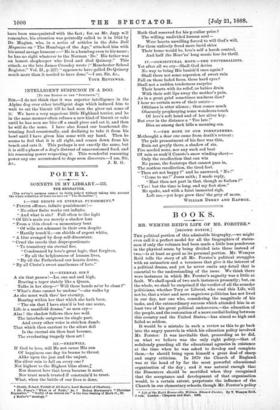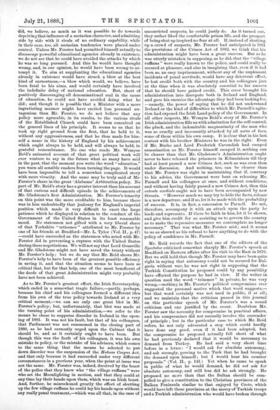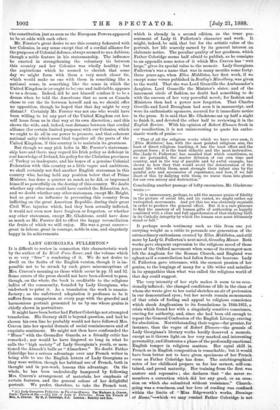BOOKS.
MR. WEMYSS REID'S LIFE OF MR. FORSTER.* [SECOND NOTICE.] THE political portion of this admirable biography,—we might even call it a perfect model for all the biographies of states- men if only the volumes had been made a little less ponderous. in the physical sense, by being divided into three instead of two,—is at least as good as its personal portion. Mr. Wemyss Reid tells the story of all Mr. Forster's political struggles- with an animation and a terseness that give it the interest of a political drama, and yet he never omits any detail that is essential to the understanding of the issue. We think there were instances in which Mr. Forster's sagacity was a little at fault. We shall speak of two such instances presently ; but, on• the whole, we shall be surprised if the verdict of all the sounder politicians, whether Tory or Liberal, who read this Life, will not be, that a wiser and more sagacious politician has not lived in our day, nor one who, considering the magnitude of his tasks, and the extraordinary success which attended him in at least two of his great political endeavours,—the education of the people, and the restoration of a more cordial feelin g between this country and the United States,---has aimed so high and, failed so seldom.
It would be a mistake in such a review as this to go back into the angry quarrels in which his education policy involved Mr. Forster: It was inevitable that, proceeding as he did, on what we believe was the only right policy, that of sedulously guarding all the educational agencies in existence at the time when he was asked to develop and complete them,—he should bring upon himself a great deal of sharp. and angry criticism. In 1870 the Church of England. was at the head of by far the most powerful educational- organisation of the day ; and it was natural enough that the Dissenters should be mortified when they recognised that the acceptance and development of that organisation would, to a certain extent, perpetuate the influence of the Church in our elementary schools, though Mr. Forster's policy • Life of the Bight Honourable William Edward Forster. By T. Wemyss Reid. 2 cola. London : Chapman and Hall. did, we believe, as much as it was possible to do towards depriving that influence of a sectarian character, and admitting Bide by side with it rivals of no ordinary capability, while in their case, too, all sectarian tendencies were placed under control. Unless Mr. Forster had permitted himself actually to discourage powerful educational agencies already in existence, we do not see that he could have avoided the attacks by which he was so long pursued. And this he would have thought wrong, and, in our opinion, he would have been wrong to at- tempt it. To aim at supplanting the educational agencies already in existence would have struck a blow at the best kind of earnestness,—a blow which would, we believe, have been fatal to his aims, and would certainly have involved the indefinite delay of national education. But, short of positively discouraging all denominational zeal in the cause of education, he could not have avoided doing what he did ; and though it is possible that a Minister with a more ingratiating manner might have excited less personal an- tagonism than Mr. Forster, we do not believe that any policy more agreeable, in its results, to the various rivals of the Established Church could have been conceived on the general lines of his principle. It seems to us that he took up right ground from the first, that he held to it, without any aggressiveness, and that he thus made for him- self a name in the history of England by his achievement which ought always to be held, and will always be held, in grateful remembrance. No one who reads Mr. Wemyss Reid's animated account of that great political work will ever venture to say in the future what so many have said in the past, that the moment you write the word " education," you warn all sensible readers from turning the page. It would have been impossible to tell a somewhat complicated story with more vivacity. And the same may be truly said of Mr. Forster's share in the great Alabama' Arbitration policy. No part of Mr. Reid's story has a greater interest than his account of that curious and difficult episode in the achievements of Mr. Gladstone's first Administration. Mr. Forster's tenacity on this point was the more creditable to him, because there was in him undoubtedly that jealousy for England's imperial position which made it very difficult to exert the large patience which he displayed in relation to the conduct of the Government of the United States in its least reasonable mood. No statesmen not gifted with a very liberal share of that Yorkshire " reticence " attributed to. Mr. Forster by one of his friends at Bradford—Mr. L. Tylor (Vol. II., p.47) —could have succeeded as the statesmen who acted with Mr. Forster did in preventing a rupture with the United States during these negotiations. We will not say that Lord Granville and Mr. Gladstone might not have saved the treaty without Mr. Forster's help ; but we do say that Mr. Reid shows Mr. Forster's help to have been of the greatest possible efficiency in saving it, and that the situation seems to have been so critical that, but for that help, one of the most beneficent of the deeds of that great Administration might very probably have not been achieved.
As to Mr. Forster's greatest effort, the Irish Secretaryship, which ended in a somewhat tragic failure,—partly, perhaps, because his chief and his colleagues formed a different idea from his own of the true policy towards Ireland at a very critical moment,—we can see only one great blot in Mr. Forster's policy; but, unfortunately, that blot was made at the turning point of his administration,—we refer to the means he chose to suppress disorder in Ireland in the open- ing of 1881. It was not his fault, but that of his colleagues, that Parliament was not summoned in the closing part of 1880, as he had earnestly urged upon the Cabinet that it should be, and as it certainly ought to have been. But though this was the fault of his colleagues, it was his own mistake in policy, or the mistake of his advisers, which comes to the same thing, that the means he selected to put down disorder was the suspension of the Habeas Corpus Act, and that only because it had succeeded under very different circumstances in a previous year, when the point at issue was not the same. Mr. Forster was, indeed, deceived by the boast of the police that they knew who " the village ruffians " were who set the Moonlighting in motion, and that they could at any time lay their hands upon them, which was an Irish boast. And, further, he misreckoned greatly the effect of shutting up the few village ruffians he could lay his hands upon without any really penal treatment,—which was all that in the case of unconvicted suspects, he could justly do. As it turned out, they rather liked the comfortable prison life, and the prospect of being shut up inspired no fear at all. If, instead of shutting up a crowd of suspects, Mr. Forster had anticipated in 1881 the provisions of the Crimes Act of 1882, we think that his
administration might have been a great success. But as he was utterly mistaken in supposing, as he did, that the "village ruffians " were really known to the police, and could really be secured at pleasure, and also in imagining that, even if it had been so, an easy imprisonment, without any of the unpleasant incidents of penal servitude, would have any deterrent effect, he lost credit both with the country and his colleagues just at the time when it was absolutely essential to his' success that he should have gained credit. This error brought his administration into disrepute both in Ireland and England, and gave his enemies the advantage they had been looking for, —namely, the power of saying that he did not understand Ireland or the kind of difficulties to which Mr. Parnell's agita- tion had exposed the Irish Land policy of the Government. In all other respects, Mr. Wemyss Reid's story of Mr. Forster's Irish administration fills us with admiration for the self-control, the pluck, and the indomitable magnanimity of the man who was so cruelly and incessantly attacked by all sorts of foes, some of them within his own camp. It is clear that in his last contest with his brother Ministers he was in the right: Even if Mr. Burke and Lord Frederick Cavendish had escaped assassination as Mr. Forster himself escaped it, nothing can be clearer than that Mr. Gladstone's Administration ought never to have released the prisoners in Kilmainham till they had at least passed a new Crimes Act, such as was even then under discussion. And nothing, too, can be clearer than that Mr. Forster was right in maintaining that if, contrary to his advice, the Government were bent on releasing Mr. Parnell and his colleagues at once, and without conditions, and without having fairly passed a new Crimes Act, then this entente cordiale ought not to have been accompanied by new threats. " However much we may try to hide the facts, release is a new departure, and if so, let it be made with the probability of success. It is, in fact, a concession to Parnell. Do not, therefore, accompany it with an attack upon the party he leads and represents. If there be faith in him, let it be shown, and give him. credit for so assisting us to govern the country as to make the repressive measures we contemplate no longer necessary." That was what Mr. Forster said ; and it seems to us as shrewd as his refusal to have anything to do with the policy of confidence in Mr. Parnell.
Mr. Reid records the fact that one of the editors of the Spectator criticised somewhat sharply Mr. Forster's speech at Bradford on Eastern affairs after his visit to the East in 1876. But we still hold that though Mr. Forster may have been quite right in saying that autonomy could not be secured for Bul- garia without war, he was not right in supposing that the Turkish Constitution he proposed could by any possibility have effected the purpose he had in view. If the writer in question used the word " trimmer" in private, he was very wrong,—nothing in Mr. Forster's political compromises ever suggested the personal motive which that word suggests,— but that word certainly was not used in public, if at all; and we maintain that the criticism passed in this journal on this particular speech of Mr. Forster's was a sound criticism and one justified by the event. Doubtless Mr. Forster saw the necessity for compromise in practical affairs, and his compromises did not usuually involve the surrender of principle ; but in the particular case to which Mr. Reid refers, he not only advocated a step which could hardly have done any good, even if it had been adopted, but the compromise he proposed actually fell short of what he had previously declared that it would be necessary to demand from Turkey. He had said a very short • time before in a letter : " I would ask for absolute autonomy,, and ask strongly, proving to the Turk that he had brought the demand upon himself ; but I would hear his counter proposals." (Vol. II., p. 141.) Yet when he came to speak in public of what he would demand, he did not ask for absolute autonomy, and still less did he ask strongly. He proposed no more their that the Sultan should be com- pelled to give a constitution to the-Christian provinces of the Balkan Peninsula similar to that enjoyed by Crete, which would have left these provinces at the mercy of Turkish troops and a Turkish administration who would have broken through. the constitution just as soon as the European Powers appeared to be at odds with each other.
Mr. Forster's great desire to see this country federated with her Colonies, in any sense except that of a cordial alliance for the purposes of Colonial defence, always seemed to us a dubious, though a noble feature in his statesmanship. The influence he exerted in strengthening the voluntary tie between this country and her Colonies was wholly healthy ; but the aspirations which he seemed to cherish that some day we might form with them a very much closer tie, which would make us one with them in something like a national sense, in something like the sense in which the United Kingdom is (or ought to be) one and indivisible, appears to us a dream. Indeed, did he not himself confess it to be a dream when he told the Americans that so soon as Canada -chose to cut the tie between herself and us, we should offer no opposition, though he hoped that that day might be very distant ? Certainly Mr. Forster was not one who would have been willing to let any part of the United Kingdom cut her- self loose from us in that way at its own discretion; and this shows the wide, and, indeed, vast distance between that cordial alliance (for certain limited purposes) with our Colonies, which we ought to do all in our power to promote, and that coherent national unity which must bind together all the parts of the United Kingdom, if this country is to maintain its greatness.
But though we may pick holes in Mr. Forster's statesman- ship here and there, may regard his Irish policy as deficient in real knowledge of Ireland, his policy for the Christian provinces of Turkey as inadequate, and his hopes of a genuine Colonial Federation with this country as a little vague and ambitious, we shall certainly not find another English statesman in this country who, having held any position below that of Prime Minister, has done a quarter as much as he did, or impressed himself so powerfully on the destiny of this country. We doubt whether any other man could have carried the Education Act, and we doubt whether any other statesman, except Mr. Bright, had as great an influence in preventing this country from inflicting on the great American Republic, during their great Civil War, injuries which, had they been actually inflicted, it would not even now have forgiven or forgotten, or whether any other statesman, except Mr. Gladstone, could have done as much as Mr. Forster did to effect the happy reconciliation the fruits of which we still enjoy. His was a great career— great in labour, great in courage, noble in aim, and singularly happy in its achievements.




































 Previous page
Previous page